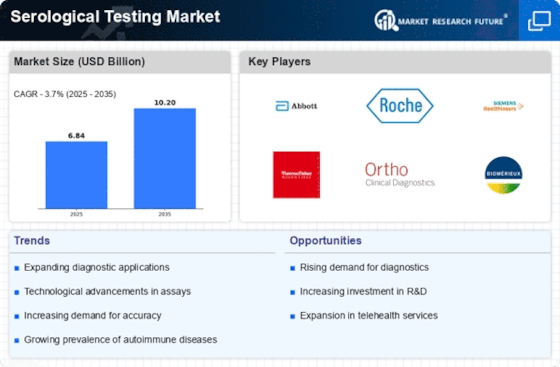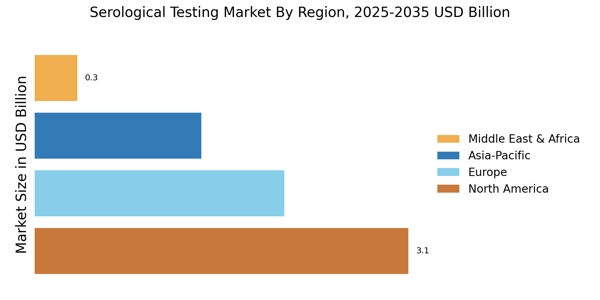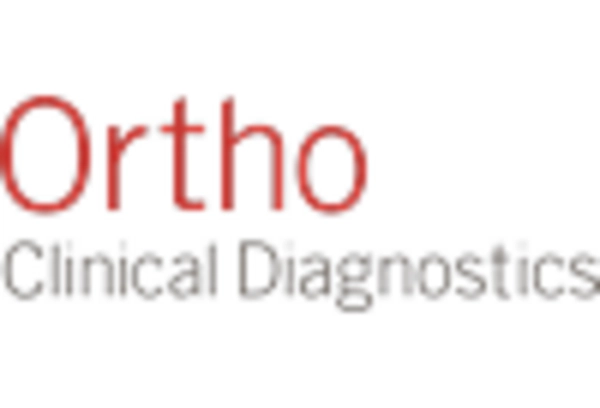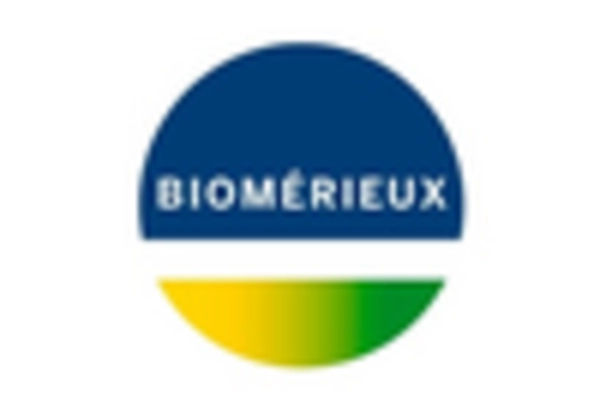Expansion of Healthcare Infrastructure
The expansion of healthcare infrastructure is a significant driver for the Serological Testing Market. As healthcare facilities grow and evolve, there is an increasing need for reliable diagnostic tools, including serological tests. This expansion is particularly evident in emerging markets, where investments in healthcare are on the rise. Enhanced healthcare infrastructure not only improves access to testing but also facilitates the integration of advanced diagnostic technologies. As a result, the Serological Testing Market is likely to experience growth as more healthcare providers adopt serological testing as a standard practice in patient care.
Rising Incidence of Infectious Diseases
The Serological Testing Market is experiencing growth due to the rising incidence of infectious diseases. As the prevalence of conditions such as hepatitis, HIV, and other viral infections increases, the demand for serological tests is likely to rise. According to recent data, the incidence of infectious diseases has shown a steady increase, prompting healthcare providers to seek effective diagnostic solutions. This trend indicates a growing need for accurate and timely serological testing, which can aid in early detection and treatment. Consequently, the Serological Testing Market is poised for expansion as healthcare systems prioritize the implementation of advanced testing methodologies to combat these diseases.
Growing Awareness of Preventive Healthcare
The increasing awareness of preventive healthcare is a key driver for the Serological Testing Market. As individuals become more proactive about their health, there is a rising demand for diagnostic tests that can identify potential health issues before they escalate. Serological tests play a crucial role in preventive healthcare by providing insights into immune status and exposure to various pathogens. This trend is reflected in the growing number of health campaigns and initiatives aimed at educating the public about the importance of regular testing. Consequently, the Serological Testing Market is likely to see a surge in demand as more individuals seek out these essential diagnostic tools.
Technological Innovations in Testing Methods
Technological advancements are significantly influencing the Serological Testing Market. Innovations such as automated testing systems, point-of-care testing devices, and enhanced assay techniques are improving the accuracy and efficiency of serological tests. For instance, the introduction of high-throughput screening methods has enabled laboratories to process a larger volume of tests in a shorter time frame. This not only enhances diagnostic capabilities but also reduces the burden on healthcare facilities. As a result, the Serological Testing Market is likely to benefit from these technological improvements, which are expected to drive demand for more sophisticated testing solutions.
Regulatory Support and Funding for Diagnostic Solutions
Regulatory support and increased funding for diagnostic solutions are pivotal factors driving the Serological Testing Market. Governments and health organizations are recognizing the importance of robust diagnostic capabilities in managing public health. This has led to the establishment of favorable regulatory frameworks and increased investment in research and development for serological testing. For example, funding initiatives aimed at enhancing laboratory infrastructure and supporting innovative testing methods are becoming more prevalent. Such support is expected to foster growth within the Serological Testing Market, as it encourages the development and adoption of new testing technologies.




 Source: Primary Research, Secondary Research, Market Research Future Database and Analyst ReviewFurthermore, its global footprint allows Ortho Clinical Diagnostics to serve and respond effectively to the diverse needs of different regions, ensuring it remains a formidable contender in the serological testing arena. Hologic has carved out a significant niche within the Global Serological Testing Market, known for its high-quality diagnostic solutions and dedication to women's health diagnostics.The company is recognized for its innovative approach to serological testing, frequently introducing advanced technologies that improve testing accuracy and reduce turnaround times. Hologic excels in the realm of molecular diagnostic testing, which complements its serological testing offerings, thus providing a comprehensive suite of diagnostic tools that enhance clinical decision-making.Its strengths lie in its ability to fuse cutting-edge technology with a deep understanding of evolving healthcare needs. Additionally, Hologic's strategic partnerships and collaborations further extend its reach and effectiveness in the marketplace, allowing for the rapid adaptation of its products to meet emerging public health challenges.The company’s ongoing commitment to research and development ensures that it stays at the forefront of innovation, addressing the growing demands for rapid and reliable serological tests in various healthcare settings, establishing Hologic as a strong player within the global landscape.
Source: Primary Research, Secondary Research, Market Research Future Database and Analyst ReviewFurthermore, its global footprint allows Ortho Clinical Diagnostics to serve and respond effectively to the diverse needs of different regions, ensuring it remains a formidable contender in the serological testing arena. Hologic has carved out a significant niche within the Global Serological Testing Market, known for its high-quality diagnostic solutions and dedication to women's health diagnostics.The company is recognized for its innovative approach to serological testing, frequently introducing advanced technologies that improve testing accuracy and reduce turnaround times. Hologic excels in the realm of molecular diagnostic testing, which complements its serological testing offerings, thus providing a comprehensive suite of diagnostic tools that enhance clinical decision-making.Its strengths lie in its ability to fuse cutting-edge technology with a deep understanding of evolving healthcare needs. Additionally, Hologic's strategic partnerships and collaborations further extend its reach and effectiveness in the marketplace, allowing for the rapid adaptation of its products to meet emerging public health challenges.The company’s ongoing commitment to research and development ensures that it stays at the forefront of innovation, addressing the growing demands for rapid and reliable serological tests in various healthcare settings, establishing Hologic as a strong player within the global landscape.












